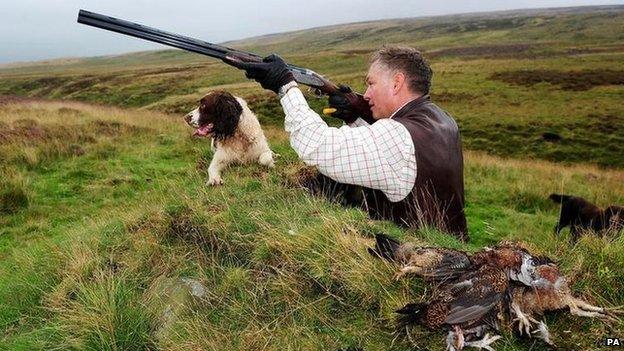Bird of prey group calls for grouse shooting licences
- Published

Landowners and gamekeepers said the introduction of a licensing system would be "draconian"
Scottish Environment Minister Paul Wheelhouse is being urged to introduce licences for grouse shooting.
The Scottish Raptor Study Group said the measures were necessary because of the continued persecution of birds of prey on Scotland's grouse moors.
But landowners and gamekeepers have defended their record, insisting the introduction of a licensing system would be "draconian".
Mr Wheelhouse did not rule out the possibility of a future scheme.
In a letter to the environment minister, the Scottish Raptor Study Group (SRSG) argued that sporting estates, companies and individuals should have to apply for a licence to operate grouse shoots.
It said the licences should only be issued to those who can demonstrate they are fit to hold them.
The SRSG is made up 300 volunteers who monitor the numbers of birds of prey across Scotland.
It has also published research which, it claims, shows that active golden eagle nests are much less likely to be found in areas of Scotland which are intensively managed for grouse shooting.
It said inactive golden eagle territories were much more likely to be found on driven grouse moors.
RSPB Scotland has also called on the Scottish government to consider new measures to tackle the killing of legally-protected birds of prey.
Duncan Orr-Ewing, the organisation's head of species and land management said: "It is clear to us that significant illegal raptor killing is still occurring in Scotland, particularly on land managed for driven grouse shooting.
"We are calling on the Scottish government to act now on previous commitments, and to consider what further sanctions may be employed to stamp out such criminal practices once and for all.
"There is no place for these crimes in 21st Century Scotland."
'No purpose'
A spokesman for Scottish Land & Estates, which represents landowners, said: "Little more than a year ago, the Scottish government introduced radical legislation to deal with any illegal persecution of bird species.
"There is no real basis for this to be revisited so soon and the introduction of a licensing system for red grouse management could only serve to damage and undermine a business sector that is very important to rural communities.
"There has been clear evidence from official statistics that raptor persecution is in significant decline and given this trend such draconian measures as a licensing system would serve no purpose."
The Scottish Gamekeepers Association said: "Perpetual over-regulation against responsible estates will simply put people off from investing in Scotland's countryside, gamekeepers will be taken off the moors and the species which help sustain golden eagles, such as red grouse and hares, will gradually disappear in tandem with the lack of management.
"The SGA consistently advocates that legal solutions are the only way to deal with problems where there are conflicts and has been quick to deal with proven cases of persecution, if its own members are involved.
"However, it does not feel that introducing a sweeping catch-all licensing system, which will ultimately damage the species it is designed to protect, is a sensible or workable solution."
'Robust enforcement'
The Scottish government confirmed it had received the SRSG's letter.
In a statement issued to BBC Scotland, Mr Wheelhouse did not rule out the possibility of introducing a licensing scheme in the future.
He said: "The Scottish government introduced strengthened legislation by way of the Wildlife and Natural Environment (Scotland) Act 2011, and introduced further new measures in July 2013.
"The legislation needs to be allowed to take its course. Robust and effective law enforcement is the next step in the continued efforts made here in Scotland to tackle ongoing crime.
"We believe that it is right to make the best use of existing legislation.
"However, as indicated in the past, other options would be considered if the current legislative framework (now augmented by the new measures announced in July 2013) was not achieving its objectives. This is a complex proposal, which would require careful consideration and consultation."
- Published19 December 2013
- Published4 July 2013
- Published1 July 2013
- Published10 June 2013
- Published20 December 2012
- Published9 May 2011